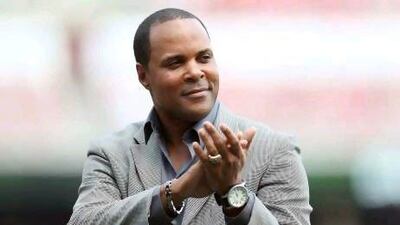Can baseball, rugby and cricket prosper in the land of football and beach volleyball?
If Brazilian sports officials have their way, they just may.
Flush with cash from a recent decade of economic growth and eager to broaden their athletic spectrum before hosting the 2016 Olympics, Brazil is on a hiring spree of foreign coaches for sports traditionally not their forte.
In recent months, an American baseball player, an English cricketer and rugby players from New Zealand have spread out over Latin America's biggest country to teach their chosen sports.
At least 30 coaches from 18 different countries are now working with Brazil's Olympic teams to help raise their games.
The recruitment comes as Brazil tries to become more competitive in sports in the run-up to the Summer Games at Rio de Janeiro.
Although all the coaches are not working in Olympic disciplines - cricket has not been played at the Games for over a century - the push is part of Brazil's effort to both raise its medal count and improve the country's abilities in non-Olympic sports.
"We've opted to bring in foreign coaches principally in disciplines in which we have little history," said Marcus Vinicius Freire, the executive superintendent for sports at the Rio-based Brazilian Olympic Committee.
Shooting, archery, wrestling and diving, he said, are among those sports getting a foreign boost.
At the recent London Olympics, Brazil won medals in nine disciplines including football, volleyball, sailing and judo, all are sports the country is traditionally strong in. The hope is to jump from 22nd place on the London medals table to within the top 10 at Rio, officials said.
The foreign coaches are attracted by the potential of a country with almost 200 million people, a diverse culture and a rabid interest in sport.
"You're not trying to take them away from other sports but give them an alternative where they can have fun," said Barry Larkin, a baseball Hall of Famer who made his name with the Cincinnati Reds in the 1980s and '90s.
For the past two years, Larkin has run a training camp at Sao Paulo for Major League Baseball as part of its attempts to globalise the sport. Recently, Brazil's baseball confederation hired him to lead a team to next month's World Baseball Classic tournament in Panama.
Larkin said that baseball is popular within Brazil's large Japanese community and that several Brazilians play professionally in Japan.
Earlier this year, Yan Gomes, a catcher and versatile infielder with the Toronto Blue Jays, became the first Brazilian to play in the big leagues. With more development, Larkin said Brazil could produce more top players.
"If there is a kid that has tremendous ability then maybe we can create the Ronaldo or the Pele in baseball, an iconic figure the country can get behind," Larkin said.
Most of the foreign coaches hail from nations with proven success in their sport. Brazil's cricket association, hired Matt Featherstone, an Englishman, as the national development officer; archers are from South Korea; weightlifters are Romanian; the canoe coaches come from Hungary.
To beef up the country's rugby programme, Brazil looked to the world champions New Zealand.
Last year, Sami Arap, the president of the Brazilian Rugby Confederation, set up a partnership with the Canterbury Crusaders, a leading New Zealand rugby team.
An initial contract brought over three coaches - including two former All Blacks - for three months as guest trainers.
Afterward, the federation signed a five-year deal with the Crusaders, and an option for five more.
Under the terms of the agreement, the visiting coaches will help raise awareness of the game and develop young players, coaches, and referees. They will also provide physical and tactical training for Brazil's more experienced rugby players.
Brazil's federation pays an annual fee to the Crusaders which covers the coaches' salaries and pays for training methods developed by the team.
"I am buying the Crusaders' know-how," Arap said.
The federation did not disclose how much the agreement was worth. Arap said the immediate aim is to establish Brazil as the No 2 team in South America behind Argentina, one of the world's rugby powers.
The Rio Olympics - where rugby sevens will be played for the first time since 1924 - may come too early to accomplish that. But qualification for the 2019 World Cup in Japan is an achievable goal, he said. For Brazil's female squad, ranked 10th in the world, the goal is to clinch a Rio medal.
Featherstone's goal for cricket is less ambitious.
There are only a handful of cricket players in Brazil, even though many children in the country grow up playing a similar game called taco.
At a recent cricket championship in Surinam, only eight members of Brazil's 13-strong team, captained by Featherstone, were born in the country.
His main task is to introduce the sport to schoolchildren and hope they like it.
The priority is making a sport known for its long games attractive to short attention spans.
"If you don't do that then people lose interest straight away," he said. "We wouldn't be telling them that it last five days, or even a day."
Follow us

